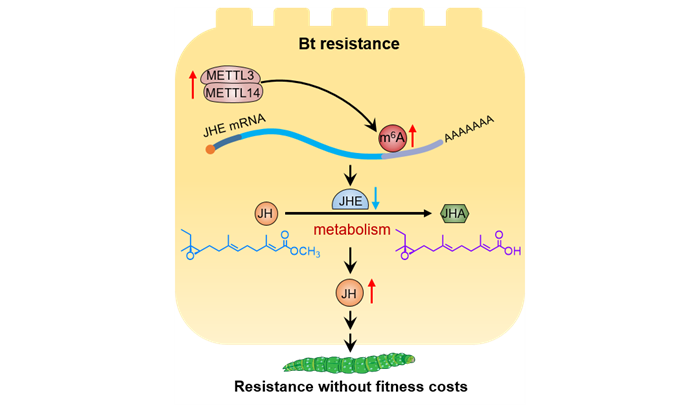RNA m6A methylation suppresses insect juvenile hormone degradation to minimize fitness costs in response to a pathogenic attack
Recently, researchers from Institute of Vegetables and Flowers (IVF) of Chinese Academy of Agricultural Sciences (CAAS), in collaboration with University of Sussex and University of Kentucky, reported their research results in a paper entitled “RNA m6A methylation suppresses insect juvenile hormone degradation to minimize fitness costs in response to a pathogenic attack” published in the journal Advanced Science .
Bioinsecticides and transgenic crops based on the bacterial pathogen Bacillus thuringiensis (Bt) can effectively control diverse agricultural insect pests, nevertheless, the evolution of resistance without obvious fitness costs has seriously eroded the sustainable use of these Bt products. In previous studies, researchers have discovered that an increased titer of juvenile hormone (JH) favors an insect host ( Plutella xylostella ) to enhance fitness whilst resisting the Bt pathogen, however, the underlying regulatory mechanisms of the increased JH titer is obscure.
In this study, researchers define the involvement of N 6-methyladenosine (m6A) RNA modification in modulating the availability of JH in this process. Specifically, they found that two m6A methyltransferase subunit genes, PxMettl3 and PxMettl14 , repressed the expression of a key JH-degrading enzyme JH esterase (JHE) to induce an increased JH titer. The elevated expression of PxMettl3 and PxMettl14 resulted in increased m6A levels in PxJHE mRNA, reducing PxJHE gene expression and eventually leading to an upregulation of JH titer to combat Bt infection with growth balance. This study identifies an as-yet uncharacterized m6A-mediated epigenetic regulator of insect hormones for maintaining fitness during pathogen defense and unveils an emerging Bt resistance-related m6A methylation atlas in insects, which further expands the functional landscape of m6A modification and showcases the pivotal role of epigenetic regulation in host-pathogen interactions.

Figure 1. Summary model showing that m6A modification serves as a key regulator in P. xylostella ’s defense against Bt pathogens.
The research was supported by the National Natural Science Foundation of China, the earmarked fund for CARS, the Beijing Key Laboratory for Pest Control and Sustainable Cultivation of Vegetables and the Science and Technology Innovation Program of the Chinese Academy of Agricultural Sciences.
More information can be found through the link: https://doi.org/10.1002/advs.202307650
By Zhaojiang Guo (guozhaojiang@caas.cn)
-
 Apr 18, 2024Opening Ceremony of the Training Workshop on Wheat Head Scab Resistance Breeding and Pest Control in Africa Held in CAAS
Apr 18, 2024Opening Ceremony of the Training Workshop on Wheat Head Scab Resistance Breeding and Pest Control in Africa Held in CAAS -
 Apr 03, 2024IPPCAAS Co-organized the Training Workshop on Management and Application of Biopesticides in Nepal
Apr 03, 2024IPPCAAS Co-organized the Training Workshop on Management and Application of Biopesticides in Nepal -
 Mar 28, 2024Delegation from the School of Agriculture and Food Science of University College Dublin, Ireland Visit to IAS, CAAS
Mar 28, 2024Delegation from the School of Agriculture and Food Science of University College Dublin, Ireland Visit to IAS, CAAS -
 Mar 25, 2024Director of World Food Prize Foundation visited GSCAAS
Mar 25, 2024Director of World Food Prize Foundation visited GSCAAS -
 Mar 20, 2024Institute of Crop Sciences (ICS) and Syngenta Group Global Seeds Advance Collaborative Research in the Seed Industry
Mar 20, 2024Institute of Crop Sciences (ICS) and Syngenta Group Global Seeds Advance Collaborative Research in the Seed Industry
